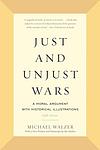Michael Walzer
Michael Walzer is a prominent American political theorist and public intellectual. He is a professor emeritus at the Institute for Advanced Study in Princeton, New Jersey, and editor of the political journal 'Dissent'. His extensive body of work covers a wide range of topics in political theory, including just and unjust wars, nationalism, ethnicity, economic justice, social criticism, radicalism, tolerance, and political obligation. He is best known for his book 'Just and Unjust Wars' (1977), which established him as a leading authority on the ethical aspects of war and conflict.
Books
This list of books are ONLY the books that have been ranked on the lists that are aggregated on this site. This is not a comprehensive list of all books by this author.
-
1. Spheres Of Justice
"Spheres of Justice" presents a theory of justice based on the concept of complex equality, arguing against a single, overarching principle for justice across all societal domains. Instead, it posits that different spheres of society—such as the market, politics, education, and family—each have their own distinct forms of social goods and require separate sets of distributive principles. The book challenges the idea of a dominant currency, like money or power, being allowed to dictate outcomes across different spheres, advocating for a pluralistic approach that respects the unique distributive patterns and criteria of justice within each sphere, thereby preventing the dominance of any one sphere over the others and ensuring a more equitable society.
The 4111th Greatest Book of All Time -
2. Just And Unjust Wars
The book is a seminal work in the field of ethics and international relations, exploring the complex questions surrounding the morality of war. It delves into the just war theory, which seeks to distinguish between justifiable and unjustifiable uses of organized armed forces. The author scrutinizes historical conflicts and contemporary wars to discuss the ethical limits of military force, the rules of engagement, and the moral responsibilities of combatants and noncombatants. The analysis provides a framework for evaluating the conduct of armed forces and the decisions of military leaders, emphasizing the principles of justice, human rights, and international law.
The 5124th Greatest Book of All Time

